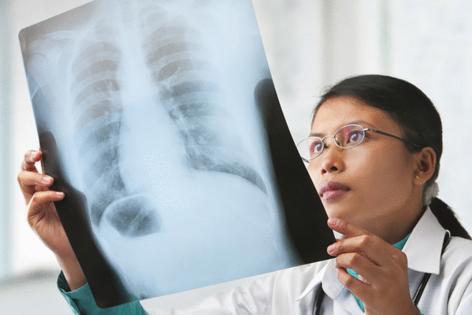More nonsmokers are getting lung cancer. A Georgia oncologist explains why
Published in News & Features
ATLANTA — The demographics of lung cancer change every day. The disease, which directly affects the respiratory system, has long been associated with smokers — but that is rapidly changing.
“Before it was rare, but now it’s more and more,” Dr. Ioana Bonta told The Atlanta Journal-Constitution.
Bonta, an oncologist at Northside Hospital in Atlanta, has watched this change slowly over time and is now ringing the alarm for more people to get themselves tested, saying, “If we cannot prevent it, it is better to find it earlier.”
Today, nonsmokers account for 20% of lung cancer deaths, according to the Lung Cancer Research Foundation, making it the fifth-leading cause of cancer deaths worldwide. According to Bonta, people are seeing cases earlier in life — in their 40s, 30s and even 20s — because of multiple risk factors, like secondhand smoke and air pollution.
Younger patients are also making lung cancer harder to detect, because many do not know the signs or symptoms. .
“With younger people, and especially nonsmokers, the problems tend to be mistaken for allergies or asthma,” Bonta explained.
According to Bonta, lung cancer symptoms are typically respiratory. People should look out for persistent coughs or bouts of shortness of breath. Unintentional weight loss is also a significant sign of lung cancer — and many other types of cancer.
“If they don’t go away, we have to look into it,” she said.
Anyone who has been a consistent smoker of anything, not just cigarettes, in the past 15 years should immediately schedule a checkup if they feel any of these symptoms. At Stage 1 or 2, lung cancer can often be successfully treated, Bonta said. Treatment can bring it down to a chronic disease similar to diabetes — even at Stage 3 or 4.
One of her patients, Joanne Cure, came to Bonta with Stage 4 lung cancer that had spread to her brain. She first went to the doctor after having a dry cough that would not go away and kept escalating in frequency and length.
“I think the general public will be shocked at how many people just walking around are fighting cancer,” Cure told the AJC.
Cure had never been a smoker. However, she had a 30-year career as a flight attendant, where she experienced a lot of secondhand smoke.
“I’d read through the news that contact smoke was probably not a good thing. I never thought about it when I was flying, though,” she said. “Being a nonsmoker, I didn’t really think about it being harmful to me personally.”
Pollution and other environmental factors may be causes of the sudden growth in lung cancer cases for nonsmokers, Bonta explained. Similarly, genetics and other familial factors can also play a part.
Kimberly Goodloe said she has no idea why her 53-year-old sister, Dr. Karen Leigh Bryant, was diagnosed with lung cancer after a lifetime of not smoking. Bryant first went to the hospital in February 2022 with heavy abdominal issues. There, she learned she had Stage 4 lung cancer. About six weeks later, on April 30, 2022, Bryant died.
“That motivated me because I didn’t want that to be the end of her story,” Goodloe shared. “I stood and made a decision in the hospital hallways to do whatever I needed to continue her fight.”
In the years since, Goodloe has learned a lot about how the disease affects nonsmokers and how patients can best advocate for themselves if they receive a diagnosis.
Most strongly, she echoes Bonta and recommends early screening whenever you feel something could be wrong, especially in the respiratory department. She recommends people be proactive with any questions they may have, even bringing a list to doctors appointments.
“If you have problems communicating with your doctor, bring someone to help you relay your message or write the questions and concerns down prior to your visit,” Goodloe said.
Goodloe also recommends seeking resources for the entire family, including caregivers.
Four years after Cure’s original diagnosis, she is in remission and has MRI and CT scans every three months — and recently had another clear checkup.
“I don’t obsess about it. It’s in my rearview mirror,” Cure said. “I think it’s the best way.”
©2025 The Atlanta Journal-Constitution. Visit at ajc.com. Distributed by Tribune Content Agency, LLC.







Comments